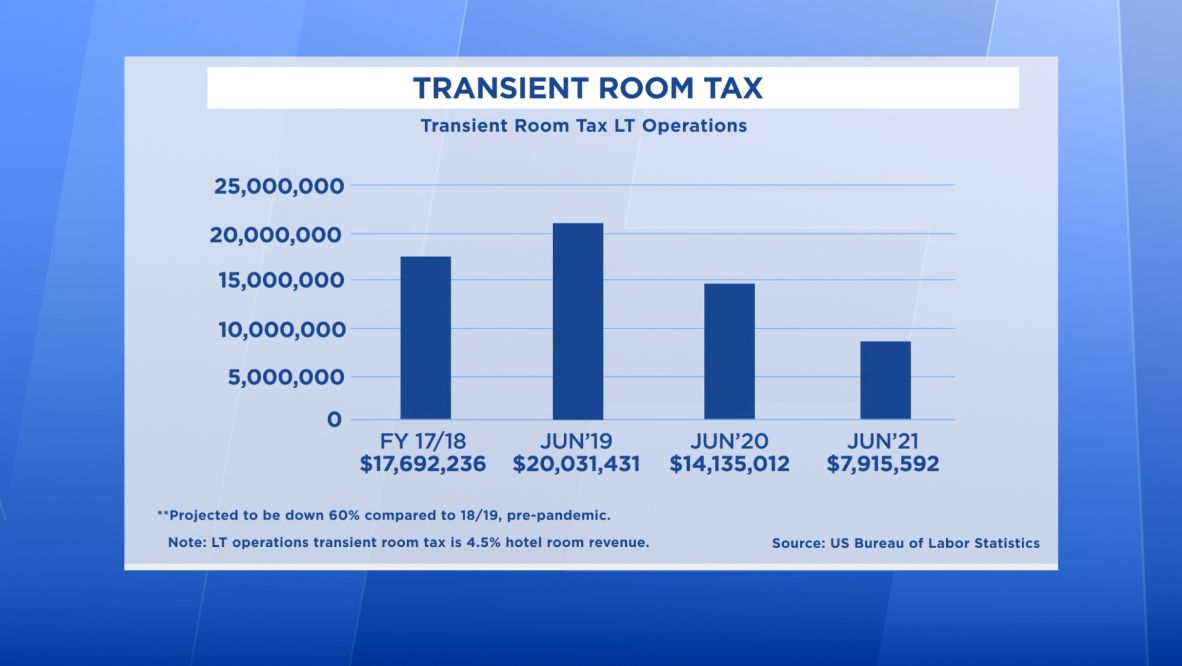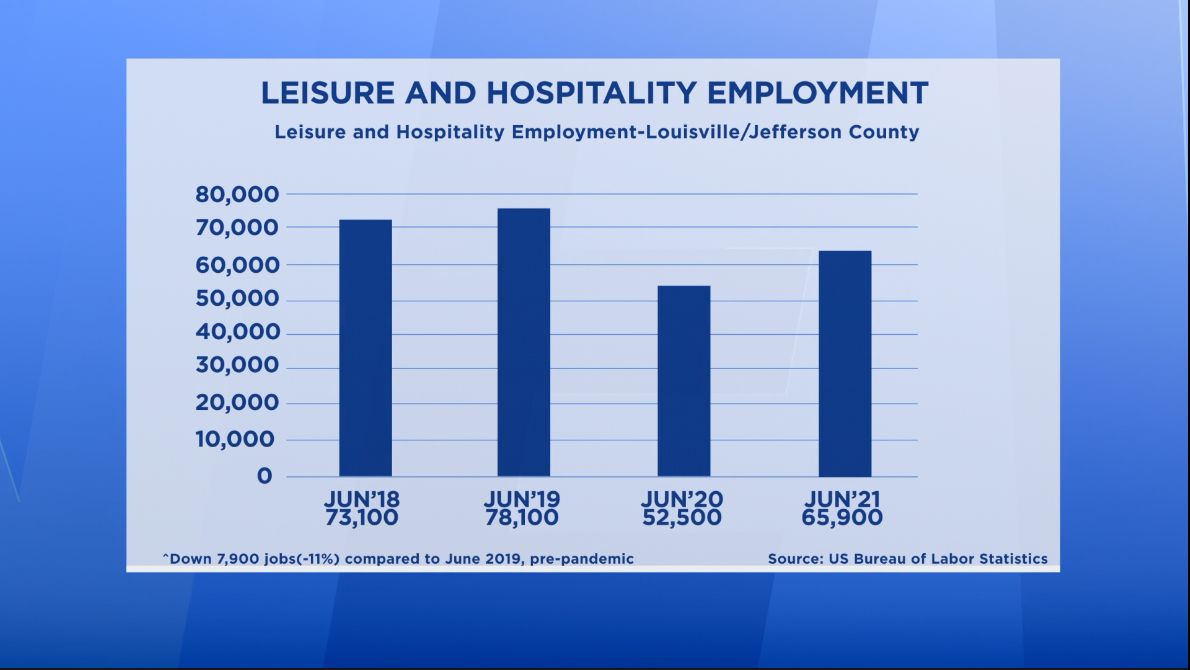LOUISVILLE, Ky. — While tourism in Louisville is bouncing back from the 2020 hit, it's still nowhere near pre-pandemic levels.
What You Need To Know
- Hotel occupancy in Louisville is projected to be down 25% from before the pandemic
- Louisville's hotel occupancy tax revenue is expected to be down 60% from pre-pandemic levels
- Employment in the hospitality and leisure industry is down 11% compared to pre-pandemic employment numbers
- Louisville Tourism will give a presentation on the status of tourism in the city at the Louisville Metro Council Committee of the Whole meeting Thursday evening
Hotel occupancy in the city is projected to be down 25% from 2019, the transient room tax is expected to be down 60% from pre-pandemic levels and the number of people employed in the hospitality and leisure industry is down 11% compared to numbers before the pandemic.
All of that information comes from a presentation Louisville Tourism will be delivering at the Louisville Metro Council Committee of the Whole meeting Thursday evening. Spectrum News 1 looked at the presentation ahead of time and talked with a spokesperson to get a more in-depth look at the state of tourism in Louisville.
Hotel occupancy came to a near halt during part of 2020, but there were still 2,150,957 rooms sold that year. That information came from the Louisville Tourism presentation, which cited Smith Travel Research as the source. That same study found things have improved with 2,981,930 rooms sold so far this year. While that improvement can be seen as a positive, Louisville Tourism projects hotel occupancy will be down 25% in 2021 compared to 2019, pre-pandemic.
That decrease in hotel occupancy has a ripple effect on the local economy. That impact isn't just because fewer people will be dining out and visiting local attractions. Louisville collects money from visitors through transient room tax, which is more commonly referred to as hotel occupancy tax. Everyone who stays at a hotel or Airbnb in the city has to pay those taxes.
During Fiscal Year 17/18, the city collected $17,692.236 from hotel occupancy tax. During Fiscal Year 18/19, that increased to $20,031,431. During FY 19/20, that dropped to $14,135,012. So far, for FY 20/21, it plummeted to $7,0915,592. Louisville Tourism projects collection of hotel occupancy tax will be down 60% compared to pre-pandemic levels.

That significant decrease in revenue impacts many things. That tax pays for things like state tourism efforts, bonds on the Kentucky Exposition Center, funding for the Kentucky Center for the Arts and more.
It also makes up a majority of the Louisville Tourism operating budget. Vice President of Marketing and Communication for Louisville Tourism Stacey Yates said that impacts the agency's ability to buy print, radio and TV ads in other cities to try to attract new visitors. The city needs more visitors to stay in hotel rooms, pay the tax and therefore continue to fund efforts to bring in more tourists. Yates said it's creating a difficult cycle.
“Right now, our CEO is trying to get some gap funding from some COVID relief funds that are out there and that have been offered to city governments, purely for marketing efforts to keep Lousiville’s brand out there so we can recruit even more business into the city moving forward because it does affect job levels,” Yates said.
Job levels are also an indicator of how the tourism industry is holding up. There has been a 25% increase in hospitality and leisure employment from 2020 to 2021 so far. That information comes from the Louisville Tourism presentation, citing the U.S. Department of Labor as the source. Despite that employment gain, Louisville Tourism expects it will still be down 7,900 jobs. That would be an 11% drop from 2019, pre-pandemic.

Tourism supports more than 57,200 jobs (70,000 pre-pandemic) in Louisville. Louisville Tourism said it generates an estimated economic impact of $3.4 billion.
Louisville Tourism also said the tourism industry generates more than $247 million in state and local tax revenue. The agency estimated tourism saves Louisville households $800 less per year in state and local taxes.
The presentation also dives into details on why people are visiting the city. Louisville Tourism said 38% are coming to vacation or getaway, 17% are coming to attend a special event, 14% are coming for business and 14% are visiting friends and family.
It also looks at what people are saying brought them to Louisville as opposed to other destinations. Thirty-one percent of visitors list Bourbon Country as a motivating factor for the trip. That's up 9.5% from 2015. Yates said that is due in large part to increased marketing efforts over the years, which led to growing the offerings of Louisville's bourbon tourism industry, often referred to as the Urban Bourbon Trail.
Thirty percent of visitors listed Louisville's culinary scene as the primary factor leading them to visit. Louisville Tourism said that's up 17%.
Sixty-four percent of respondents said they came in for day trips while 36% of Louisville tourists stayed overnight. With that information and knowing people are not booking trips well in advance during the pandemic, Louisville Tourism said it will focus marketing on cities within a one-day driving distance.
You can read Louisville Tourism's presentation here:



